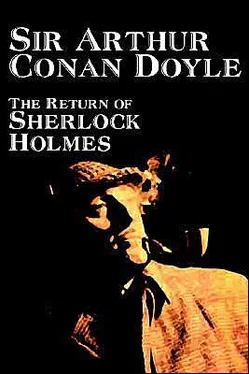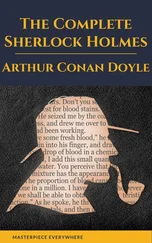Arthur Doyle - The Return of Sherlock Holmes
Здесь есть возможность читать онлайн «Arthur Doyle - The Return of Sherlock Holmes» — ознакомительный отрывок электронной книги совершенно бесплатно, а после прочтения отрывка купить полную версию. В некоторых случаях можно слушать аудио, скачать через торрент в формате fb2 и присутствует краткое содержание. Город: London, Год выпуска: 2004, ISBN: 2004, Издательство: Wildside Press LLC, Жанр: Классический детектив, на английском языке. Описание произведения, (предисловие) а так же отзывы посетителей доступны на портале библиотеки ЛибКат.
- Название:The Return of Sherlock Holmes
- Автор:
- Издательство:Wildside Press LLC
- Жанр:
- Год:2004
- Город:London
- ISBN:0809594382
- Рейтинг книги:3 / 5. Голосов: 1
-
Избранное:Добавить в избранное
- Отзывы:
-
Ваша оценка:
- 60
- 1
- 2
- 3
- 4
- 5
The Return of Sherlock Holmes: краткое содержание, описание и аннотация
Предлагаем к чтению аннотацию, описание, краткое содержание или предисловие (зависит от того, что написал сам автор книги «The Return of Sherlock Holmes»). Если вы не нашли необходимую информацию о книге — напишите в комментариях, мы постараемся отыскать её.
The Return of Sherlock Holmes — читать онлайн ознакомительный отрывок
Ниже представлен текст книги, разбитый по страницам. Система сохранения места последней прочитанной страницы, позволяет с удобством читать онлайн бесплатно книгу «The Return of Sherlock Holmes», без необходимости каждый раз заново искать на чём Вы остановились. Поставьте закладку, и сможете в любой момент перейти на страницу, на которой закончили чтение.
Интервал:
Закладка:
“These theories take no account of the telegram.”
“Quite true, Watson. The telegram still remains the only solid thing with which we have to deal, and we must not permit our attention to wander away from it. It is to gain light upon the purpose of this telegram that we are now upon our way to Cambridge. The path of our investigation is at present obscure, but I shall be very much surprised if before evening we have not cleared it up, or made a considerable advance along it.”
It was already dark when we reached the old university city. Holmes took a cab at the station and ordered the man to drive to the house of Dr. Leslie Armstrong. A few minutes later, we had stopped at a large mansion in the busiest thoroughfare. We were shown in, and after a long wait were at last admitted into the consulting-room, where we found the doctor seated behind his table.
It argues the degree in which I had lost touch with my profession that the name of Leslie Armstrong was unknown to me. Now I am aware that he is not only one of the heads of the medical school of the university, but a thinker of European reputation in more than one branch of science. Yet even without knowing his brilliant record one could not fail to be impressed by a mere glance at the man, the square, massive face, the brooding eyes under the thatched brows, and the granite moulding of the inflexible jaw. A man of deep character, a man with an alert mind, grim, ascetic, self-contained, formidable—so I read Dr. Leslie Armstrong. He held my friend’s card in his hand, and he looked up with no very pleased expression upon his dour features.
“I have heard your name, Mr. Sherlock Holmes, and I am aware of your profession—one of which I by no means approve.”
“In that, Doctor, you will find yourself in agreement with every criminal in the country,” said my friend, quietly.
“So far as your efforts are directed towards the suppression of crime, sir, they must have the support of every reasonable member of the community, though I cannot doubt that the official machinery is amply sufficient for the purpose. Where your calling is more open to criticism is when you pry into the secrets of private individuals, when you rake up family matters which are better hidden, and when you incidentally waste the time of men who are more busy than yourself. At the present moment, for example, I should be writing a treatise instead of conversing with you.”
“No doubt, Doctor; and yet the conversation may prove more important than the treatise. Incidentally, I may tell you that we are doing the reverse of what you very justly blame, and that we are endeavouring to prevent anything like public exposure of private matters which must necessarily follow when once the case is fairly in the hands of the official police. You may look upon me simply as an irregular pioneer, who goes in front of the regular forces of the country. I have come to ask you about Mr. Godfrey Staunton.”
“What about him?”
“You know him, do you not?”
“He is an intimate friend of mine.”
“You are aware that he has disappeared?”
“Ah, indeed!” There was no change of expression in the rugged features of the doctor.
“He left his hotel last night—he has not been heard of.”
“No doubt he will return.”
“To-morrow is the ‘Varsity football match.”
“I have no sympathy with these childish games. The young man’s fate interests me deeply, since I know him and like him. The football match does not come within my horizon at all.”
“I claim your sympathy, then, in my investigation of Mr. Staunton’s fate. Do you know where he is?”
“Certainly not.”
“You have not seen him since yesterday?”
“No, I have not.”
“Was Mr. Staunton a healthy man?”
“Absolutely.”
“Did you ever know him ill?”
“Never.”
Holmes popped a sheet of paper before the doctor’s eyes. “Then perhaps you will explain this receipted bill for thirteen guineas, paid by Mr. Godfrey Staunton last month to Dr. Leslie Armstrong, of Cambridge. I picked it out from among the papers upon his desk.”
The doctor flushed with anger.
“I do not feel that there is any reason why I should render an explanation to you, Mr. Holmes.”
Holmes replaced the bill in his notebook. “If you prefer a public explanation, it must come sooner or later,” said he. “I have already told you that I can hush up that which others will be bound to publish, and you would really be wiser to take me into your complete confidence.”
“I know nothing about it.”
“Did you hear from Mr. Staunton in London?”
“Certainly not.”
“Dear me, dear me—the postoffice again!” Holmes sighed, wearily. “A most urgent telegram was dispatched to you from London by Godfrey Staunton at six-fifteen yesterday evening—a telegram which is undoubtedly associated with his disappearance– and yet you have not had it. It is most culpable. I shall certainly go down to the office here and register a complaint.”
Dr. Leslie Armstrong sprang up from behind his desk, and his dark face was crimson with fury.
“I’ll trouble you to walk out of my house, sir,” said he. “You can tell your employer, Lord Mount-James, that I do not wish to have anything to do either with him or with his agents. No, sir—not another word!” He rang the bell furiously. “John, show these gentlemen out!” A pompous butler ushered us severely to the door, and we found ourselves in the street. Holmes burst out laughing.
“Dr. Leslie Armstrong is certainly a man of energy and character,” said he. “I have not seen a man who, if he turns his talents that way, was more calculated to fill the gap left by the illustrious Moriarty. And now, my poor Watson, here we are, stranded and friendless in this inhospitable town, which we cannot leave without abandoning our case. This little inn just opposite Armstrong’s house is singularly adapted to our needs. If you would engage a front room and purchase the necessaries for the night, I may have time to make a few inquiries.”
These few inquiries proved, however, to be a more lengthy proceeding than Holmes had imagined, for he did not return to the inn until nearly nine o’clock. He was pale and dejected, stained with dust, and exhausted with hunger and fatigue. A cold supper was ready upon the table, and when his needs were satisfied and his pipe alight he was ready to take that half comic and wholly philosophic view which was natural to him when his affairs were going awry. The sound of carriage wheels caused him to rise and glance out of the window. A brougham and pair of grays, under the glare of a gas-lamp, stood before the doctor’s door.
“It’s been out three hours,” said Holmes; “started at half-past six, and here it is back again. That gives a radius of ten or twelve miles, and he does it once, or sometimes twice, a day.”
“No unusual thing for a doctor in practice.”
“But Armstrong is not really a doctor in practice. He is a lecturer and a consultant, but he does not care for general practice, which distracts him from his literary work. Why, then, does he make these long journeys, which must be exceedingly irksome to him, and who is it that he visits?”
“His coachman——”
“My dear Watson, can you doubt that it was to him that I first applied? I do not know whether it came from his own innate depravity or from the promptings of his master, but he was rude enough to set a dog at me. Neither dog nor man liked the look of my stick, however, and the matter fell through. Relations were strained after that, and further inquiries out of the question. All that I have learned I got from a friendly native in the yard of our own inn. It was he who told me of the doctor’s habits and of his daily journey. At that instant, to give point to his words, the carriage came round to the door.”
Читать дальшеИнтервал:
Закладка:
Похожие книги на «The Return of Sherlock Holmes»
Представляем Вашему вниманию похожие книги на «The Return of Sherlock Holmes» списком для выбора. Мы отобрали схожую по названию и смыслу литературу в надежде предоставить читателям больше вариантов отыскать новые, интересные, ещё непрочитанные произведения.
Обсуждение, отзывы о книге «The Return of Sherlock Holmes» и просто собственные мнения читателей. Оставьте ваши комментарии, напишите, что Вы думаете о произведении, его смысле или главных героях. Укажите что конкретно понравилось, а что нет, и почему Вы так считаете.












